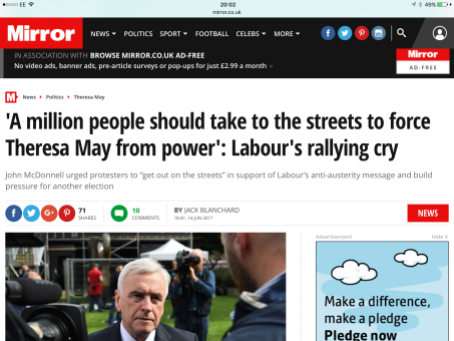BY PROFESSOR COLIN TALBOT
On Sunday 11th June I tweeted this:

Guess what happens the day after?

Crystal ball? No, just understanding the mindset of Bennite (Corbyn) and Trotskyist (McDonnell) politicos.
To explain.
In an earlier post I argued in detail that both Trots and Bennites think that real change only comes about through mass mobilization, not through Parliament. Indeed ‘parliamentary struggle’ they see as a diversion from real class struggle and mobilization of the masses.
There is growing evidence that the JC/JMcD General Election campaign focused not so much on winning seats as votes – concentrating on places they could pile up votes. That as a result they ended up gaining seats is a side-effect of their campaign rather than the aim.
Having won 262 seats and 40% of the vote (to the Tories 317 and 42.4%) Corbyn and McDonnell started proclaiming that Labour had really ‘won’ the election. This seemed, on the face of it bizarre. There is no obvious route for them to become the Government as I explain here and Channel 4’s FactCheck also examines here. So why were they doing it?
Because it is the first step in what I’ll call their “insurgency strategy”.
Step One – which is more Trotskyist than Bennite – is to do everything to delegitimize the current regime and portray it as being in crisis. Usually this is done by placing undeliverable ‘transitional demands’ that seem quite reasonable but they know the old system cannot deliver. In this case they are trying a different approach – delegitimize the General Election outcome.
This should have the effect of encouraging their supporters and the ‘wider’ masses Labour really did win, the Tory government is illegitimate and most importantly it is vulnerable to mass pressure.
Step Two – mobilize on the streets, and don’t worry too much about Parliament. John McDonnell announced the first part today – ‘get a million people of the streets’. The second part is a little less obvious.
In interviews over the weekend John McDonnell rejected any idea of bringing back into the Shadow Cabinet the experienced moderate Labour MPs – people like Yvette Cooper, Hilary Benn, Chuka Umunna – with the argument that “you don’t break up a winning team”.
This tells you two things.
First it tells you the priority is to consolidate the Corbynistas control of the Labour Party and its machinery. McDonnell will push for ‘reforms’ at the Autumn Labour Conference to consolidate their power and ensure a succession should Corbyn retire from the leadership.
Second, the it tells us that the ‘parliamentary struggle’ really is secondary. Many commentators have pointed out that Labour has a host of unused, very experienced, talent languishing on the backbenches. They could make mincemeat of a weakened Conservative government in the House of Commons and on the airwaves.
So it’s “to the barricades, comrades”. Well, to the streets anyway.
Professor Colin Talbot was born in Dover in 1952. Professor Talbot is currently Professor of Government in Politics in the School of Social Sciences at the University of Manchester. He has also been an adviser to UK Parliamentary Committees on HM Treasury and Public Administration. Colin is the author of The Paradoxical Primate (2004) and several other books. Colin blogs here.


